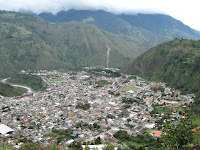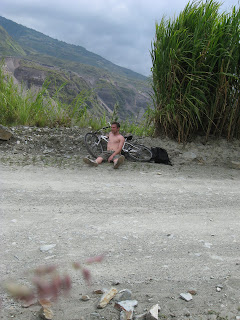
When I left the jungle last Thursday I had no intention of stopping in Baños (above). But there is an adventurous alure that draws foreigners and Europens alike to the mountain resort town. It is a current tourist highlight for anyone´s trip in Ecuador, but I have seen black and white pictures of its past, families dining over waterfalls, young men scaling ropes across canyons, and I think it has long been a place of cavalier spirit. I suppoose that living under an active volcano, in a valley of rushing cascades, invigorates something relaxed but renegade in its people. I felt the same. After four days of biking, bathing in volcanic hot springs, hiking, and on the last day, rafting (my new favorite sport), I felt replenished and ready for something new. For the sake of my mother I did not jump off the 100 meter bridge on my way out of town (from now on, I will either not jump off tall things or not tell anyone, to spare my family worry), but instead took the first bus out to a small provincial capital, Guaranda, where I was the only white guy in town, again people laughing at my elementary Spanish.
That night I took a bottle of coke and cheap Ecuatorian whiskey--predictably terrible--and sat in the plaza under the watchful eyes of Simon Bolivar, reading Les Miserables on a bench under lamp and moonlight. I relished the opportunity to sit alone in public, without Europeans or smog, able to read my book and eat local french fries (the best I´ve had yet, served with three kinds of sauce, onions, and fried chicken on top). Above me the moon provided fantastic light. When lonely sometimes, I have found consolation in the idea that the sun shines on everybody, in all parts of the world, but I think the same cannot be said of its always-changing counterpart. In Guaranda, the moon possessed a halo, a nocturnal rainbow filtered through the clouds, and I realized how seldomly I had bothered to look up at night in Ecuador. But I also realized that I have become boring at night. Eating fries and reading my book, falling asleep early, hanging out with mild Europeans and rarely going to bars or testing my salsa skills. But there is a remedy for this. Easter and the Coast. This week is Semana Santa, and for any Catholic country this is reason enough to party, and the best parties are supposed to by the sandy Pacific stretches.
This morning I left Guaranda early and took the first bus to Guayaquil, the largest city in the country and a southern start to its longer coast. I am starting to log a lot of hours on the bus, so much that I feel more comfortable, more enchanted on a bus through the mountains than I do settling into a hostal. For me, the bus window is like a movie screen, a view of the moving pictures of the nation´s remarkable geography and a glimpse into the domestic lives of rural roadside families. For the first half of my trip, I watched the window movie, and its theme has been mountainous. Going to Guayaquil, I closed my eyes (on the buses, because of its bumpiness, reading or writing is impossible, so there are only two things to do, sleep or look out the window), and when I awoke the road was flat and the mountains absent. Instead I saw men wading waist high through vast fields of tall grass, waving machetes, impoverished houses on stilts, unpainted and weathered, with rotten bridges leading to more men lying in hammocks on porches, a wet and beautiful sort of poverty.
Soon, the bus pulled into a three story station in Guayaquil, and when I stepped off I discovered a giant mall inside, complete with sweepstakes cars and a McDonald´s. Not far away, a friend had told me, I could find a TGI Friday´s. I admit, the temptation of American culinary comfort was tempting, and to make it more develish, I saw beautiful women my age that for once were not yet mothers (god-blessed cathlolic country). I went to a ticket counter, simply to inquire about a place I wanted to visit, and before I knew it, I was on a bus to a different place I had never heard of (Jipijapa, prononced Hippie-hoppa) .
By evening, I was taking my first ever swim in the Pacific Ocean in the small wild town of Puerto Lopez, equipped with dirt roads, lizards, rats, turtles, motorized rigshaws, and enough long-haired men and women selling crafts to shame the Haight-Ashbury. The beach was thin and beautiful, symmetrically bracketed on its north and south ends by gorgeously carved rock bluffs, offering a strange and exotic sense of isolation. The distant horizon seemend infinite, but the immediate horizon was filled with boats and birds fishing between the waves. The water, warm and wonderful.
I hate to interrupt the parade of good sentiments, but I have to post here three bad things, goddamnit, because every person needs a chance to vent, and since I travel alone, you will have to hear my complaints:
1. Mosquitos. They are bad here, my room is harvesting thirty or more of them, and after dousing my body in Deet, they are relegated to biting my face.
2. Littering. Ecuadorians litter. A lot. For someone who spent the last two years forcefully encouraging the children I worked with to pick up their trash (if you kick it, you pick it, I´d say), it is painful to watch kids and parents alike throw the remains of their lunch out bus windows when a trash bag is next to them. If it weren´t for the trash lining the beach, I might have mistaken Puerto Lopez for heaven. People throw garbage into the perfect Pacific as if venerating its waters by offering it sacrficial trash. I hate it.
3. I lost my camera. I took three buses for eight hours today and after taking pictures of the stilted marshland communities, I left it on my seat. Some lucky bastard is showing it to his/her family now. I have lost them before, in a taxicab in Israel, in a mountain creek in the Smokies, which is why I bought one used before traveling again and saved my pictures whenever possible. But from now on, unless I buy an unreasonably expensive (because of the import taxes) camera, you will have to bear with my descriptions as images. If I could take only more picture to show you, it would be of the beach here, which I hear is less beautiful than its neighbors ¡Que Pena!
And finally, after finishing my Ecuatorian whisky the other night, I dreamed of a fun, new segment for the blog. It´s a gimmick, sure, but I am going to perform it anyways. For someone who reads, travels, and writes, metaphors are irresistable. So with each blog from now on, I will offer a metaphoror or few, without any purport (it´s for you to find the meaning). They might not seem like metahpors, perhaps proverbs instead, or just literal advice, but I swear there are a few levels if you are inclined to read them. So, to finish here, finally, I present to you (because we are all travelers, even if only within our own streets, unless you haven´t left that goddamn couch or computer chair today)....
The Traveler´s Proverbial Metaphors
1. Kiss the Locals (even if only the cheeks, but more is better)
2. Eat Food You Don´t Understand
3. Don´t drink the water, but don´t be afraid to swim in it
 on the good road....paz y abrazos
on the good road....paz y abrazos



















